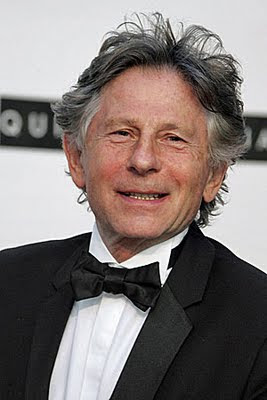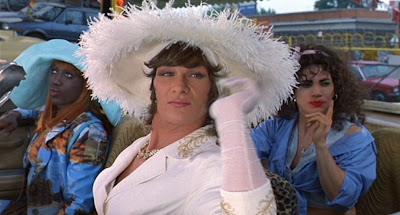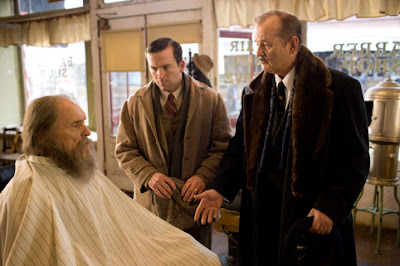 Charged with alternating currents of clammy suspense and implacable tragedy, Rabia sustains interest as an understated chamber drama that always seems just one violent outburst away from something truly terrifying. Ecuadoran filmmaker Sebastian Cordero (Cronicas) enhances the overall mood of claustrophobic and voyeuristic dread with perfect-pitch performances by his first-rate players and cinematographer Enrique Chediak's atmospheric Steadicam visuals. You can read the rest of my Variety review here.
Charged with alternating currents of clammy suspense and implacable tragedy, Rabia sustains interest as an understated chamber drama that always seems just one violent outburst away from something truly terrifying. Ecuadoran filmmaker Sebastian Cordero (Cronicas) enhances the overall mood of claustrophobic and voyeuristic dread with perfect-pitch performances by his first-rate players and cinematographer Enrique Chediak's atmospheric Steadicam visuals. You can read the rest of my Variety review here.
Wednesday, September 30, 2009
TIFF review: Rabia
 Charged with alternating currents of clammy suspense and implacable tragedy, Rabia sustains interest as an understated chamber drama that always seems just one violent outburst away from something truly terrifying. Ecuadoran filmmaker Sebastian Cordero (Cronicas) enhances the overall mood of claustrophobic and voyeuristic dread with perfect-pitch performances by his first-rate players and cinematographer Enrique Chediak's atmospheric Steadicam visuals. You can read the rest of my Variety review here.
Charged with alternating currents of clammy suspense and implacable tragedy, Rabia sustains interest as an understated chamber drama that always seems just one violent outburst away from something truly terrifying. Ecuadoran filmmaker Sebastian Cordero (Cronicas) enhances the overall mood of claustrophobic and voyeuristic dread with perfect-pitch performances by his first-rate players and cinematographer Enrique Chediak's atmospheric Steadicam visuals. You can read the rest of my Variety review here.
No kidding: Sundance almost didn't happen for Robert Redford
 To celebrate the 40th anniversary of the premiere of Butch Cassidy and the Sundance Kid -- gosh, has it really been around that long? -- Sean P. Means of The Salt Lake City Tribune tracked down Robert Redford for a rare interview. According to Means, "the seemingly predestined path from The Sundance Kid to everything that now bears the Sundance name -- the ski resort, the institute, the film festival, the cable channel and the catalog store -- was a combination of luck, timing and happenstance." That's because, as Redford admits, he wasn't the first choice for the role that has become so closely associated with his life and work: "I was sent up to read for Butch Cassidy, because that was the more obvious role -- you know, more lively and more comic, more energetic and youthful, because I was about 13 years younger than Paul [Newman]. The original title of [William] Goldman's screenplay was The Sundance Kid and Butch Cassidy, because Paul was going to play the Sundance Kid." But a funny thing happened on the way to production...
To celebrate the 40th anniversary of the premiere of Butch Cassidy and the Sundance Kid -- gosh, has it really been around that long? -- Sean P. Means of The Salt Lake City Tribune tracked down Robert Redford for a rare interview. According to Means, "the seemingly predestined path from The Sundance Kid to everything that now bears the Sundance name -- the ski resort, the institute, the film festival, the cable channel and the catalog store -- was a combination of luck, timing and happenstance." That's because, as Redford admits, he wasn't the first choice for the role that has become so closely associated with his life and work: "I was sent up to read for Butch Cassidy, because that was the more obvious role -- you know, more lively and more comic, more energetic and youthful, because I was about 13 years younger than Paul [Newman]. The original title of [William] Goldman's screenplay was The Sundance Kid and Butch Cassidy, because Paul was going to play the Sundance Kid." But a funny thing happened on the way to production...
Monday, September 28, 2009
TIFF review: Cleanflix
.jpg) Some movies are just good enough to make you wish they were a lot better. Cleanflix, for better or worse, is one of those movies.
Some movies are just good enough to make you wish they were a lot better. Cleanflix, for better or worse, is one of those movies.
Sunday, September 27, 2009
TIFF review: Reel Injun
 Reel Injun is a sincere and straightforward documentary about cinematic depictions of Native Americans from the silent era to contemporary times. Produced with backing from the National Film Board of Canada, the picture follows Cree Indian director Neil Diamond -- no, not that Neil Diamond -- on a cross-country road trip as he interviews Native American critics, academics, cineastes and standup comics, along with a few non-Indian notables (including Clint Eastwood and Jim Jarmusch, to fashion a mostly critical but ultimately hopeful history lesson. You can read my Variety review here.
Reel Injun is a sincere and straightforward documentary about cinematic depictions of Native Americans from the silent era to contemporary times. Produced with backing from the National Film Board of Canada, the picture follows Cree Indian director Neil Diamond -- no, not that Neil Diamond -- on a cross-country road trip as he interviews Native American critics, academics, cineastes and standup comics, along with a few non-Indian notables (including Clint Eastwood and Jim Jarmusch, to fashion a mostly critical but ultimately hopeful history lesson. You can read my Variety review here.
TIFF review: Road, Movie
.jpg) Dev Benegal's aptly titled Road, Movie is a modestly amusing dramedy that is all the more pleasant for its fleeting detours into cheeky fantasy. You can read my Variety review here.
Dev Benegal's aptly titled Road, Movie is a modestly amusing dramedy that is all the more pleasant for its fleeting detours into cheeky fantasy. You can read my Variety review here.
The day I asked Roman Polanski why he might want to return to the U.S.
 Nineteen Eighty-Six was was a very good year for U.S. journalists at the Cannes Film Festival -- provided, of course, you had the testicular fortitude to be there. Coming so soon after the U.S. bombing of Libya, the festival was viewed by many -- mostly, it should be noted, by those who had never actually visited the festival before -- as a perfect target for terrorists seeking payback. Which explains why so many American movie stars, moviemakers and movie critics were conspicuous by their absence during the event, making it much easier for those of us who were there to get good quote from the notables in attendance.
Nineteen Eighty-Six was was a very good year for U.S. journalists at the Cannes Film Festival -- provided, of course, you had the testicular fortitude to be there. Coming so soon after the U.S. bombing of Libya, the festival was viewed by many -- mostly, it should be noted, by those who had never actually visited the festival before -- as a perfect target for terrorists seeking payback. Which explains why so many American movie stars, moviemakers and movie critics were conspicuous by their absence during the event, making it much easier for those of us who were there to get good quote from the notables in attendance.
Which, it turn, may explain why Roman Polanski was so generous with his time during my extended interview with him at Cannes that year. He was there to promote Pirates -- one of his lesser films, to be sure -- and I was grateful for the chance to speak with him for the Houston Post. Our conversation continued much longer than I expected -- in part, I suspect, because there were fewer than expected U.S. journalists on hand to request face time -- and he actually insisted that I stay a bit longer after I voiced my concern that, hey, maybe I'd already taken up too much of his time. Maybe he was amused by the fact that a quote from my favorable review of his autobiography ("Cover to cover, Roman is as riveting a story as you're likely find!") had been prominently blurbed on the then-recent paperback edition. ("You're absolutely right, Joe," he cheerfully scribbled below the quote, above his autograph.) Or maybe he enjoyed our seriocomic riffing about whole celebrity interview process. ("Yeah, Roman, I'll probably be doing this once a week at the Old Film Critics Home..." "And I'll come by to be interviewed by all of you after I can't make movies anymore.") Or perhaps...
Today, as I heard of Polanski's arrest in Switzerland, I found myself remembering our 1986 chat. And recalling that, after hearing some loose talk at Cannes '86 about his possible return to the United States, I was emboldened to ask just why he would want to risk arrest, or worse, for such a sentimental journey. I had my own theory. Apparently, I was right. You can read the relevant half of a two-part Houston Post interview here.
Friday, September 25, 2009
A (bad) sign of the times...
 According to Variety: "Citing recessionary pressures, the CineVegas Film Festival will go on hiatus for at least a year."
According to Variety: "Citing recessionary pressures, the CineVegas Film Festival will go on hiatus for at least a year."
TIFF Review: Backyard
An impassioned yet prosaic fact-based melodrama, Backyard registers undeniable impact by providing a dramatically sound, emotionally satisfying partial solution to a mystery that remains unresolved in the real world. Trouble is, this all-too-neat wrap-up may cost director Carlos Carrera points with the very audiences most likely to appreciate the verisimilitude that prevails throughout much of this picture about the unsolved murders of hundreds of women over the past several years in Ciudad Juarez, Mexico. Still, the drama -- recently selected as Mexico's foreign-language film Oscar submission -- should enjoy a warmer reception than Bordertown, the underachieving 2006 Jennifer Lopez vehicle that covered the same territory. You can read my Variety review here.
Wednesday, September 23, 2009
I'm off to see the Wizard
Ace TV journalist Jose Grinan asks me all about The Wizard of Oz. And I actually manage to sound like I know what I'm talking about.
Raiders of the Lost Ark... '50s style
A smashingly clever answer to a heretofore unasked query: What if Raiders of the Lost Ark had been filmed as a serial back in the '50s?
Tuesday, September 22, 2009
TIFF review: Bitch Slap
 Some films are made to be shown on the midnight-movie circuit. Other films can never be shown late enough. Consider, if you will, Bitch Slap, a desperately unfunny attempt to satirically recycle cliches and archetypes from sexploitation action flicks of the 1960s and '70s within the time-trippy, multiple-flashback framework of a Quentin Tarantino extravaganza. Much like the lesser parodies that arrived near the very end of the mid-'60s spy-spoof cycle, this self-consciously campy farrago offers too little, too late, while tediously burlesquing movies that no one took seriously in the first place. You can read my complete Variety review here -- though, really, I don't have a lot more to say about this time-waster.
Some films are made to be shown on the midnight-movie circuit. Other films can never be shown late enough. Consider, if you will, Bitch Slap, a desperately unfunny attempt to satirically recycle cliches and archetypes from sexploitation action flicks of the 1960s and '70s within the time-trippy, multiple-flashback framework of a Quentin Tarantino extravaganza. Much like the lesser parodies that arrived near the very end of the mid-'60s spy-spoof cycle, this self-consciously campy farrago offers too little, too late, while tediously burlesquing movies that no one took seriously in the first place. You can read my complete Variety review here -- though, really, I don't have a lot more to say about this time-waster.
From the director of The Cabinet of Dr. Caligari... Der Rosenkavalier (with musical accompaniment by the Houston Symphony)
 Six years after he mesmerized audiences with the expressionistic fantasia of The Cabinet of Dr. Caligari (1919), director Robert Weine, a giant of German silent cinema, tried his hand at adapting Richard Strauss' popular opera Der Rosenkavalier. That he was working at a slight disadvantage -- he was making a silent movie version of, uh, an opera -- didn't impede his efforts at all. Indeed, Weine threw himself into the project with sufficient zeal to convince the opera's librettist, Hugo von Hofmannsthal, to write the screenplay. (Well, OK, he wrote the title cards -- but you get the idea.) But wait, there's more: After seeing the film, Strauss was moved to recompose and adapt his own opera score into a film score. He even converted the vocal arrangements into arrangements that various instruments could play. This marrying of the reconstituted score to the silent movie was finally premiered at the Königliches Opernhaus in Dresden on January 10, 1926, under the direction of the legendary Max Reinhardt.
Six years after he mesmerized audiences with the expressionistic fantasia of The Cabinet of Dr. Caligari (1919), director Robert Weine, a giant of German silent cinema, tried his hand at adapting Richard Strauss' popular opera Der Rosenkavalier. That he was working at a slight disadvantage -- he was making a silent movie version of, uh, an opera -- didn't impede his efforts at all. Indeed, Weine threw himself into the project with sufficient zeal to convince the opera's librettist, Hugo von Hofmannsthal, to write the screenplay. (Well, OK, he wrote the title cards -- but you get the idea.) But wait, there's more: After seeing the film, Strauss was moved to recompose and adapt his own opera score into a film score. He even converted the vocal arrangements into arrangements that various instruments could play. This marrying of the reconstituted score to the silent movie was finally premiered at the Königliches Opernhaus in Dresden on January 10, 1926, under the direction of the legendary Max Reinhardt.For decades, Weine's Der Rosenkavalier was considered a "lost film." The good news is, it recently was restored by film preservationists. The better news -- if you're anywhere near Houston this weekend -- is that Der Rosenkavalier -- Film and Music will have its North American premiere Friday through Sunday, Sept. 25-27, at Jones Hall in Downtown Houston, with the esteemed Houston Symphony, conducted by Hans Graf, offering accompaniment. You can order your tickets here.
Review: In Search of Beethoven
The name of the movie is In the Search of Beethoven and... OK, here's a MAJOR SPOILER ALERT... They find him. No, really. You can read my Variety review here.
TV alert: 8 am Wednesday, Sept. 23
 I'll be appearing sometime during the 8 am hour of the Fox 26 Morning News telecast on Houston station KRIV/Channel 26 tomorrow, Sept. 23. Why? Well, they're doing a segment on the 70th anniversary of The Wizard of Oz, and they wanted someone to provide informed commentary. Well, either that, or they wanted someone who looks like a cowardly lion at that early hour. In any event, gets those TiVos warmed up now...
I'll be appearing sometime during the 8 am hour of the Fox 26 Morning News telecast on Houston station KRIV/Channel 26 tomorrow, Sept. 23. Why? Well, they're doing a segment on the 70th anniversary of The Wizard of Oz, and they wanted someone to provide informed commentary. Well, either that, or they wanted someone who looks like a cowardly lion at that early hour. In any event, gets those TiVos warmed up now...
Remarks about remakes
Since all of the really important critics were tied up with the Toronto Film Festival last week, CNN.com writer Grace Wong couldn't be choosy when she sought someone to interview for her story about movie remakes. So she had to resort to calling... well, me. But that's OK: She managed to write a fine story anyway.
Monday, September 21, 2009
Get Low gets a distributor

Sony Pictures Classics has acquired North American rights to one of the best movies to premiere at this year's Toronto Film Festival. Apparently, there is a God.
Themes like old times
If you were a fan of Easy Listening radio during the '60s and '70s, you couldn't avoid the musical stylings of Ferrante & Teicher. And, really, you wouldn't want to. The piano-playing duo recorded scores of LPs and charted several hit singles, running the gamut from Broadway standards to light classical works, but they remain most fondly memembered by movie buffs for their classy recordings of themes from The Apartment, Exodus, Midnight Cowboy, Pieces of Dreams, A Man and a Woman, Live for Life and dozens of other films. Louis Teicher passed away in August 2008. Over the weekend, Arthur Ferrante joined his fellow keyboardist in that great music hall in the sky.
For me, Ferrante & Teicher symbolize an era in movie-musicianship when a picture's title tune might prove more memorable -- and, through heavy rotation on Easy Listening radio, more enduring -- than the picture itself. Indeed, I wonder how many people even know that "Pieces of Dreams" -- also recorded by such notables as Barbra Streisand, Johnny Mathis and Shirley Bassey -- actually was a movie theme. For the record: It was an Oscar-nominated song composed by no less than a luminary than Michel Legrand for a long-forgotten 1970 flick starring Robert Forster as a Catholic priest undergoing a crisis of faith, and Lauren Hutton as a beautiful social worker who leads him into temptation. To be fair, I haven't seen the movie since its original theatrical release, so I can't say for certain whether it deserves its obscurity. But, hey, it obviously did a lot more for Ferrante & Teicher than it did for Forster or Hutton, right?
For me, Ferrante & Teicher symbolize an era in movie-musicianship when a picture's title tune might prove more memorable -- and, through heavy rotation on Easy Listening radio, more enduring -- than the picture itself. Indeed, I wonder how many people even know that "Pieces of Dreams" -- also recorded by such notables as Barbra Streisand, Johnny Mathis and Shirley Bassey -- actually was a movie theme. For the record: It was an Oscar-nominated song composed by no less than a luminary than Michel Legrand for a long-forgotten 1970 flick starring Robert Forster as a Catholic priest undergoing a crisis of faith, and Lauren Hutton as a beautiful social worker who leads him into temptation. To be fair, I haven't seen the movie since its original theatrical release, so I can't say for certain whether it deserves its obscurity. But, hey, it obviously did a lot more for Ferrante & Teicher than it did for Forster or Hutton, right?
Can the indie "bloodbath" be traced to the decline of critcis?
After surveying the scene at the just-completed Toronto International Film Festival, Anne Thompson reports on the sad state of the indie film market. (Like me, she's surprised to see that Get Low couldn't nail down a distribution deal during TIFF.) Roger Ebert echoes her insights -- and adds a few of his own -- here.
For what it's worth, I posted this comment on Ebert's blog (which, like Thompson's, is required reading for any serious cinéaste):
I strongly suspect that, years from now, when pop-culture historians are writing about the early-21st-century indie film crisis, many will note a direct correlation between the decline in audiences for indie films and the decline of film critics on newspapers in major and secondary markets. Seriously. Yes, I know: Newspapers still run wire-service reviews. But that’s hardly the same thing as having someone on staff who’s an active advocate for indie movies, who’s eager to interview indie filmmakers – and who urges editors to occasionally make a review of an indie film the lead review in a Friday paper. Also: I think readers are more likely to heed the advice of a critic they have come to know, if not always agree with. That is, a critic who is a visible member of the community – someone who’s interviewed on local TV from time to time, who lectures and/or introduces films at museums and other venues, and whose reviews may get debated on radio talk shows.
Of course, there’s another factor to consider: The decline of newspapers, period. Yes, there are many, many websites where people can read astute and/or entertaining reviews of films. But those sites are frequented by people already inclined to see movies. With newspapers, you have what I call The Happenstance Factor: Someone leafing through the paper might stumble across a review of an indie movie – a movie he or she might not otherwise know about – and become sufficiently interested to actually go see the film in a first-run theater. I can’t tell you how many times I had people (even editors and fellow staffers) tell me back when I reviewed films for the now-defunct Houston Post that they never would have heard about (much less gone to see) certain movies if they hadn’t serendipitously come across my review while looking for the comics page or the horoscope column. Unfortunately, that sort of thing rarely happens on the Internet.
For what it's worth, I posted this comment on Ebert's blog (which, like Thompson's, is required reading for any serious cinéaste):
I strongly suspect that, years from now, when pop-culture historians are writing about the early-21st-century indie film crisis, many will note a direct correlation between the decline in audiences for indie films and the decline of film critics on newspapers in major and secondary markets. Seriously. Yes, I know: Newspapers still run wire-service reviews. But that’s hardly the same thing as having someone on staff who’s an active advocate for indie movies, who’s eager to interview indie filmmakers – and who urges editors to occasionally make a review of an indie film the lead review in a Friday paper. Also: I think readers are more likely to heed the advice of a critic they have come to know, if not always agree with. That is, a critic who is a visible member of the community – someone who’s interviewed on local TV from time to time, who lectures and/or introduces films at museums and other venues, and whose reviews may get debated on radio talk shows.
Of course, there’s another factor to consider: The decline of newspapers, period. Yes, there are many, many websites where people can read astute and/or entertaining reviews of films. But those sites are frequented by people already inclined to see movies. With newspapers, you have what I call The Happenstance Factor: Someone leafing through the paper might stumble across a review of an indie movie – a movie he or she might not otherwise know about – and become sufficiently interested to actually go see the film in a first-run theater. I can’t tell you how many times I had people (even editors and fellow staffers) tell me back when I reviewed films for the now-defunct Houston Post that they never would have heard about (much less gone to see) certain movies if they hadn’t serendipitously come across my review while looking for the comics page or the horoscope column. Unfortunately, that sort of thing rarely happens on the Internet.
Iconic Amelia
 Just in time for moviegoers to prepare themselves for the Oct. 23 release of Amelia -- Mira Nair's eagerly awaited biopic about Amelia Earhart, with Oscar-winner Hilary Swank in the title role -- The New Yorker offers Judith Thurman's fascinating account of the legendary aviatrix and her final flight. The money quote: "There were, in fact, other famous female aces in the early decades of aviation. All of them were daring—some were said to be better pilots than Earhart—and many of them were killed and forgotten. If Earhart became an 'icon,' it was, in part, because women who aspired to excel in any sphere, at a high altitude, looked upon her as their champion. But it was also because the unburied come back to haunt us."
Just in time for moviegoers to prepare themselves for the Oct. 23 release of Amelia -- Mira Nair's eagerly awaited biopic about Amelia Earhart, with Oscar-winner Hilary Swank in the title role -- The New Yorker offers Judith Thurman's fascinating account of the legendary aviatrix and her final flight. The money quote: "There were, in fact, other famous female aces in the early decades of aviation. All of them were daring—some were said to be better pilots than Earhart—and many of them were killed and forgotten. If Earhart became an 'icon,' it was, in part, because women who aspired to excel in any sphere, at a high altitude, looked upon her as their champion. But it was also because the unburied come back to haunt us."
Saturday, September 19, 2009
To Patrick Swayze, thanks for everything
 While combing through my archives, I found this interview I did with Patrick Swayze during the 1995 New York junket for To Wong Foo, Thanks for Everything, Julie Newmar. It was a movie, he admitted, for which he had to struggle to land an audition -- because, evidently, no one involved thought he was right for the part of Vida, a drag queen performer.
While combing through my archives, I found this interview I did with Patrick Swayze during the 1995 New York junket for To Wong Foo, Thanks for Everything, Julie Newmar. It was a movie, he admitted, for which he had to struggle to land an audition -- because, evidently, no one involved thought he was right for the part of Vida, a drag queen performer.
"Early on," Swayze said, "when I first heard about it, I couldn't even get a script for it. And my agent couldn't get me in (for an interview), and they wouldn't see me, because, you know, Patrick Swayze is terminally macho. It wasn't until the end, when they had exhausted all their other possibilities, that I got to go in."
And even then, Swayze wasn't allowed to see the script until a few hours before the audition. He read a few pages, saw that Vida has several long speeches, and immediately realized he didn't have time to properly prepare.
"So I told them, `Look, I can't do these words. So if this is a case where I have to do these words, forget it. But if you let me come in, I'll give you a half-hour monologue on my life as a drag queen, and see if I can turn into Vida while I watch her materialize in the mirror.'
"And I wound up giving them an hour-long monologue. I just took Patrick Swayze's life, and told it as if he'd grown up as a drag queen in Texas. And that was a neat story. " Yes, indeed.
Tuesday, September 15, 2009
TIFF review: Harry Brown
 It’s tempting, and not entirely inaccurate, to describe Harry Brown as a geriatric Death Wish
It’s tempting, and not entirely inaccurate, to describe Harry Brown as a geriatric Death WishMonday, September 14, 2009
R.I.P.: Patrick Swayze (1952-2009)
 Please don’t misunderstand: Patrick Swayze and I weren’t bowling buddies or anything like that, and I don’t want to sound like I’m trying to pass myself off as someone grieving for a close, personal friend. But I find myself deeply saddened by his demise – and, yes, more than a little peeved that, being caught up in the Toronto Film Festival right now, I don’t have nearly enough time to write a farewell worthy of the guy.
Please don’t misunderstand: Patrick Swayze and I weren’t bowling buddies or anything like that, and I don’t want to sound like I’m trying to pass myself off as someone grieving for a close, personal friend. But I find myself deeply saddened by his demise – and, yes, more than a little peeved that, being caught up in the Toronto Film Festival right now, I don’t have nearly enough time to write a farewell worthy of the guy.Our paths crossed several times over the years, due in no small measure to the fact that he was a Houston native, and I started interviewing him for The Houston Post as far back as The Outsiders (1983). I have very happy memories of a lunch we shared at a downtown H-Town restaurant in 1987, just before Dirty Dancing opened. He knew he was the verge of a major career breakthrough – and he was so openly, eagerly exuberant that I experienced a kind of contact high just sitting near him.
I remember an uproarious incident during the press junket for Point Break in the Loews Santa Monica Beach Hotel. I was walking toward my room after a morning of roundtable interviews when I heard Swayze shouting my name from across the atrium. When I turned to respond, I saw he was on a floor two stories above mine, with one leg draped over the railing, pretending he was preparing to dive into the lobby far below. So I had to shout back in response: “Don’t do it, Patrick! You have so much to live for! The movie’s not that bad!” He laughed so hard, I momentarily feared he might lose his balance and really take the drop. I laughed, too, but I didn’t actually smile until he took his leg off the railing.
I don’t pretend to have known the man very well, but, as I say, I always enjoyed talking with him, and always appreciated his seemingly boundless enthusiasm. I cannot believe there isn’t a place somewhere on the other side where such a vital spirit can continue to thrive. More, later.
I don’t pretend to have known the man very well, but, as I say, I always enjoyed talking with him, and always appreciated his seemingly boundless enthusiasm. I cannot believe there isn’t a place somewhere on the other side where such a vital spirit can continue to thrive. More, later.
TIFF review: Get Low
 With meticulously variegated measures of sly humor, homespun grace and affecting poignancy, Get Low casts a well-nigh irresistible spell while spinning a Depression Era folk tale from the Tennessee backwoods. Robert Duvall compellingly underplays the larger-than-life lead role of Felix Bush, a notorious hermit who rejoins society only to plan his own funeral party, and he’s backed by smartly cast supporting players (including Bill Murray and Lucas Black) who clearly savor the twofer of portraying vividly drawn characters opposite an Oscar-winning living legend. Appreciative reviews and savvy marketing could attract adult ticketbuyers, especially if this polished indie production emerges as a credible contender for glittering prizes. You can read my complete Variety review here.
With meticulously variegated measures of sly humor, homespun grace and affecting poignancy, Get Low casts a well-nigh irresistible spell while spinning a Depression Era folk tale from the Tennessee backwoods. Robert Duvall compellingly underplays the larger-than-life lead role of Felix Bush, a notorious hermit who rejoins society only to plan his own funeral party, and he’s backed by smartly cast supporting players (including Bill Murray and Lucas Black) who clearly savor the twofer of portraying vividly drawn characters opposite an Oscar-winning living legend. Appreciative reviews and savvy marketing could attract adult ticketbuyers, especially if this polished indie production emerges as a credible contender for glittering prizes. You can read my complete Variety review here.
Friday, September 11, 2009
A few quick words from TIFF
Lightining struck twice for me today during back-to-back press screenings at the Toronto Film Festival. Joel and Ethan Coen's A Serious Man is a low-key, pitch-perfect, straight-faced absurdist dark comedy with a surprisingly affecting impact. And, better still, an ending bound to piss off even more people than the ending of No Country for Old Men. I strongly suspect it will richly reward repeated viewings. The same can be said for Jason Reitman’s Up in the Air, which may be… oh, to hell with equivocation. It is the best movie I have seen so far in 2009. If I see anything better by year’s end, I will be greatly astonished and immensely grateful. But I’ll still probably want to go back and take another look at Reitman’s film – and at George Clooney’s career-highlight performance – just to be absolutely certain the other movie really is better.
More to come...
More to come...
Thursday, September 10, 2009
Subscribe to:
Posts (Atom)